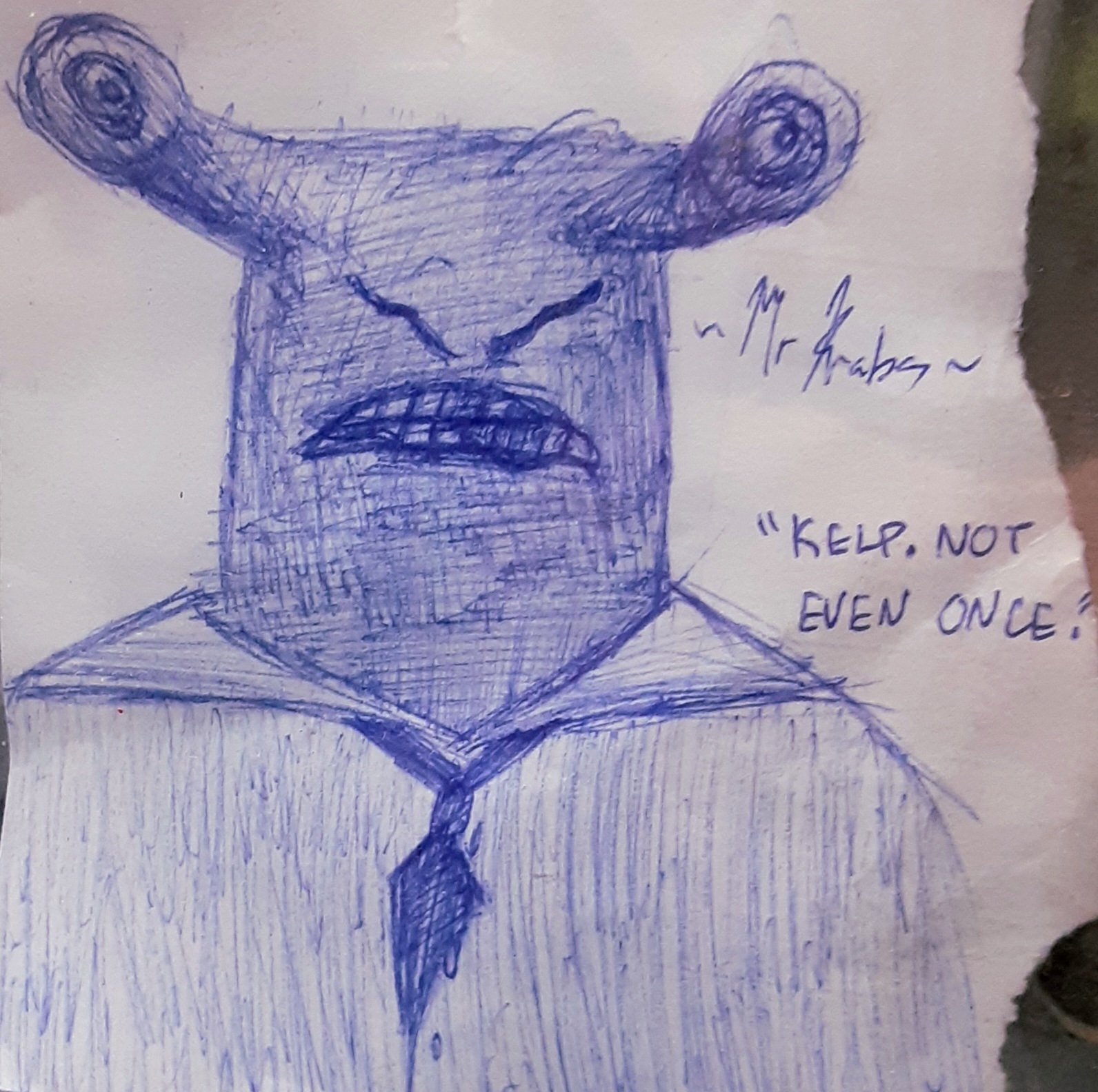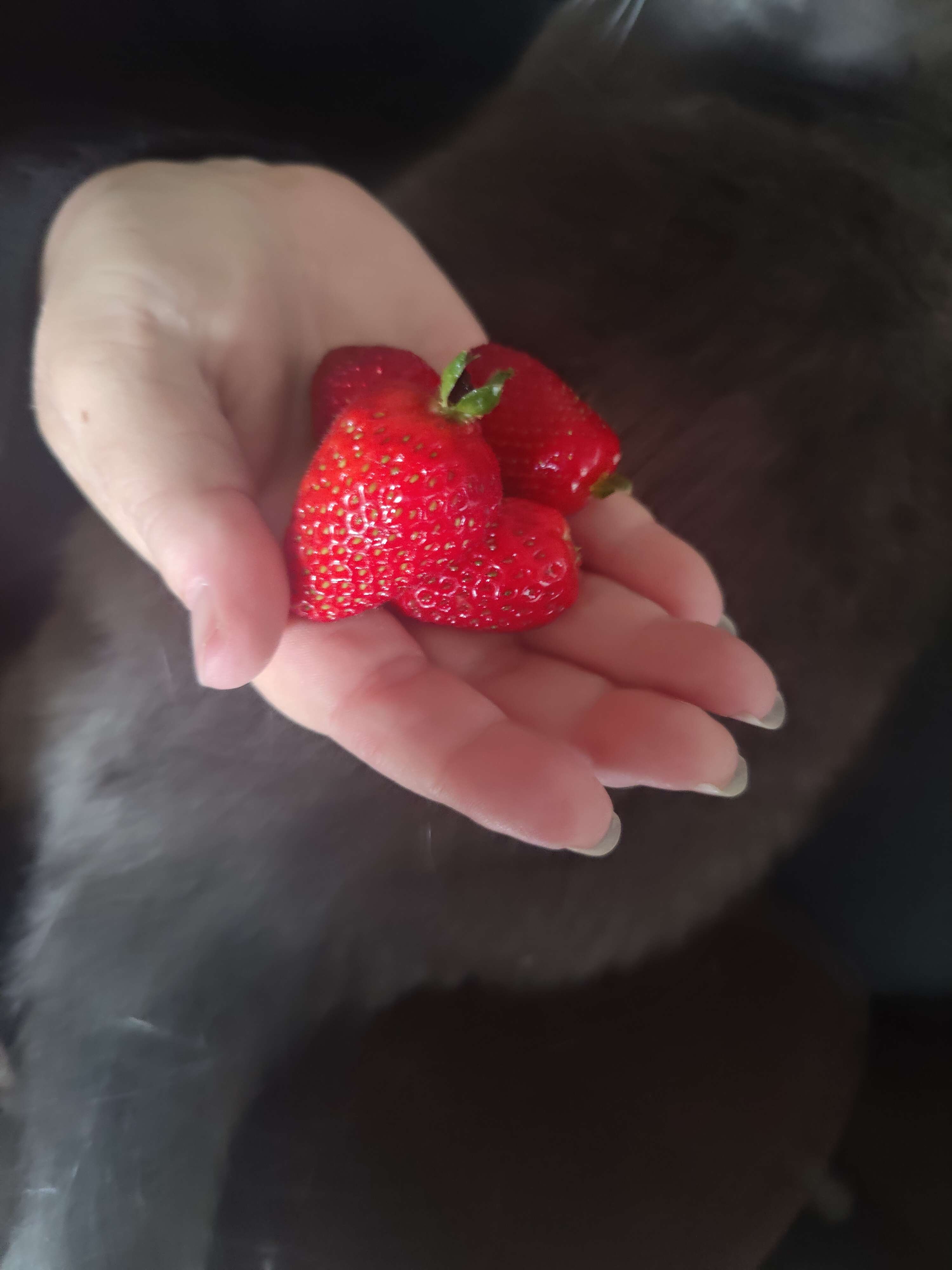Thank you Nome @NomedaBarbarian
For the visually impaired, the images are a series of Twitter screenshots.
Full transcription of text below images.
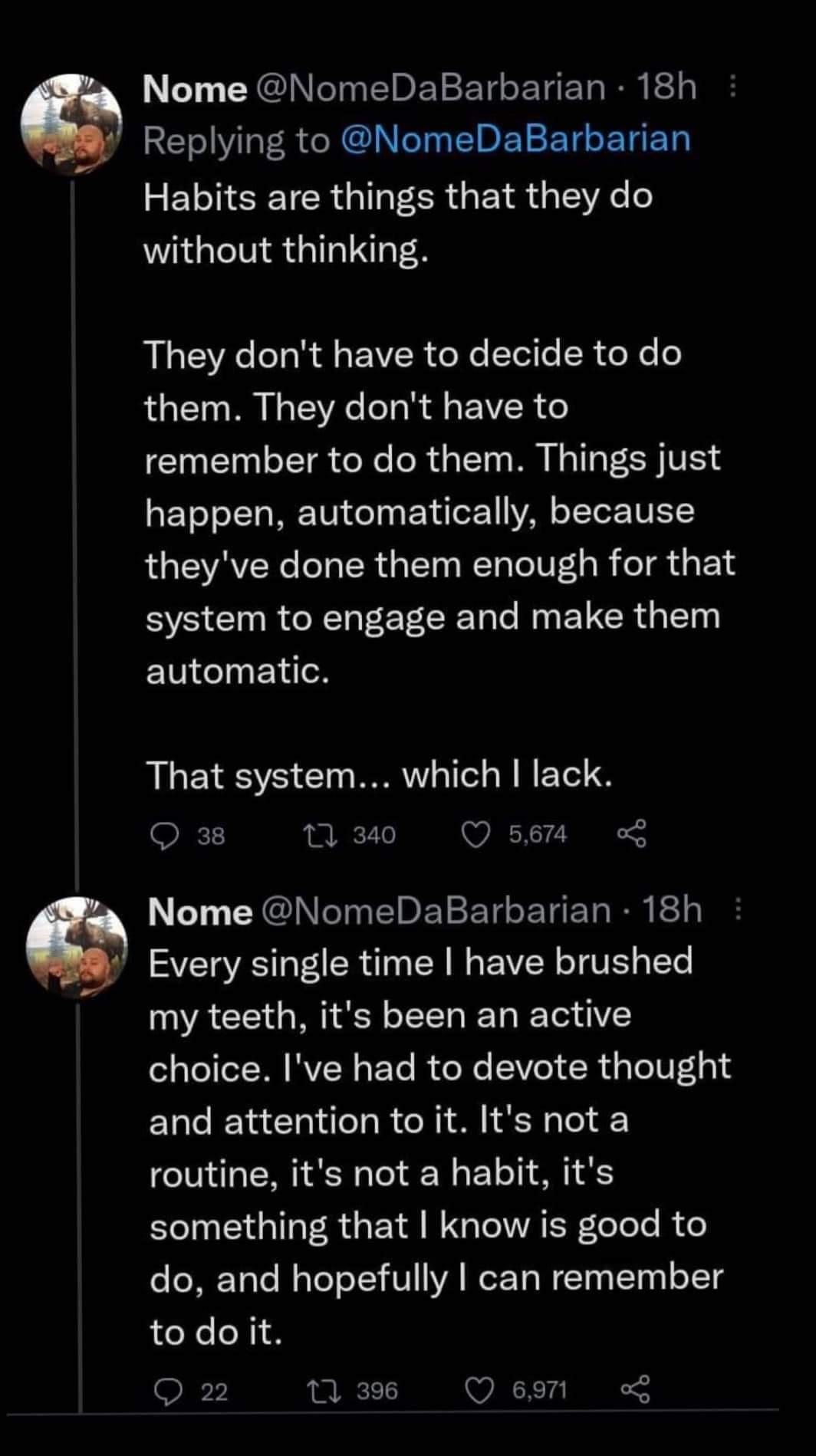
Full transcription of text below images.
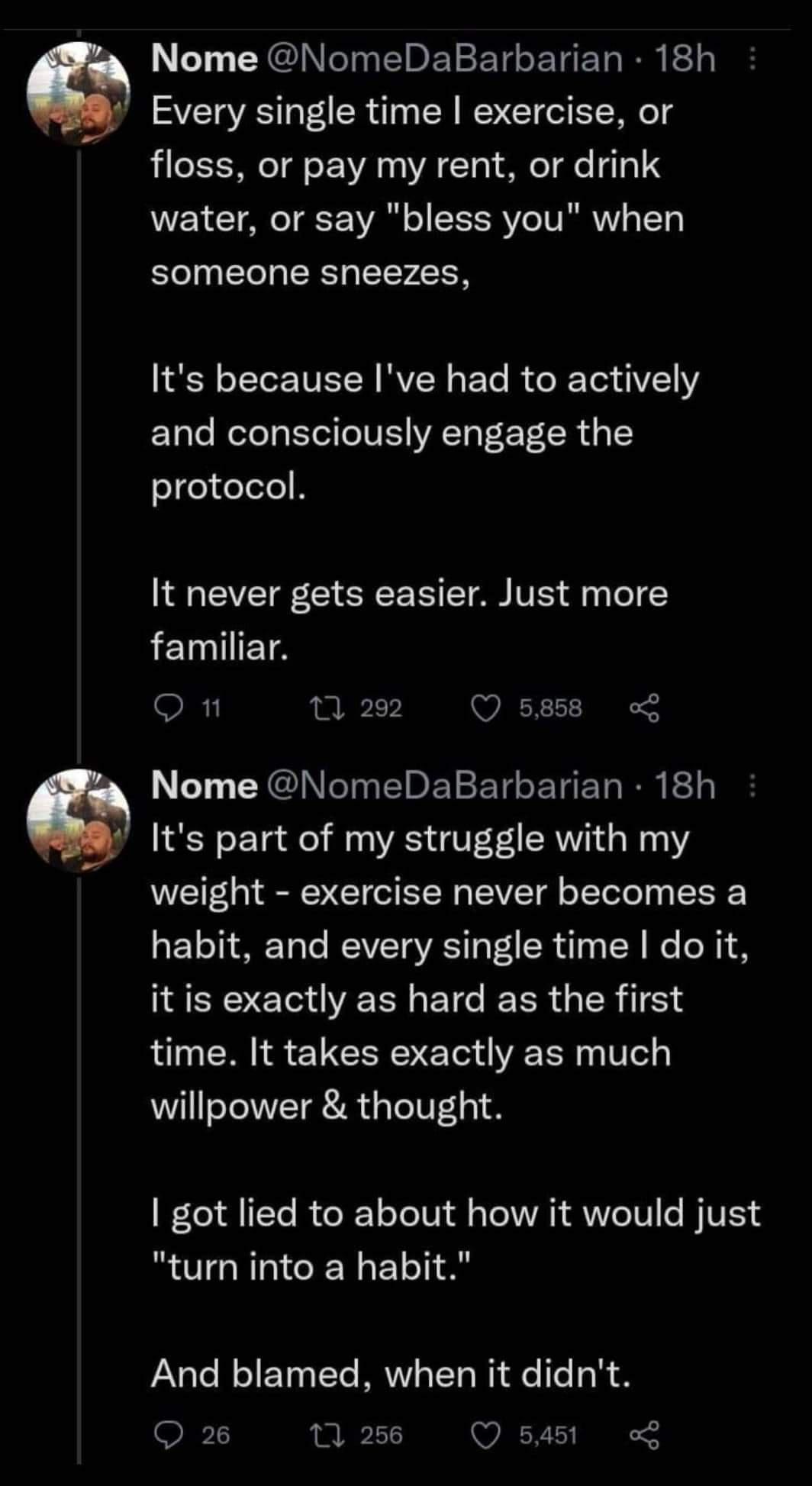
Full transcription of text below images.
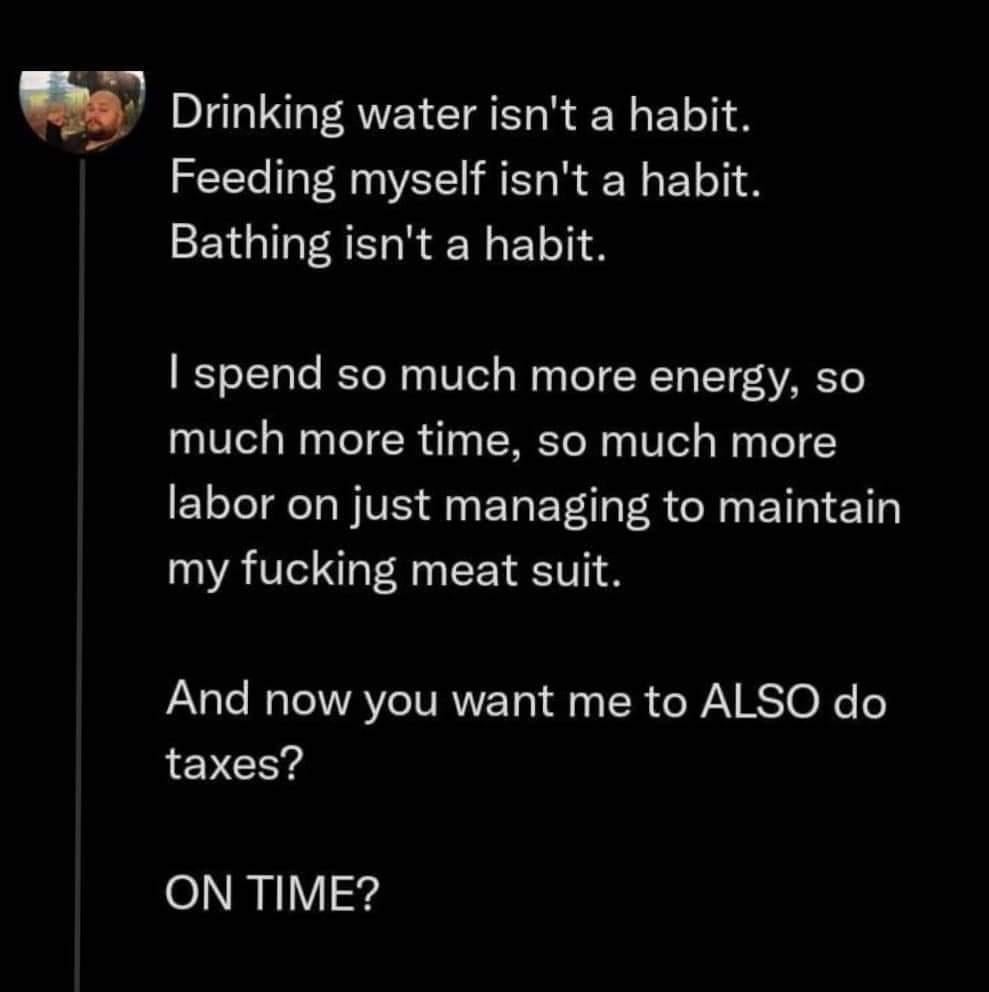
Full transcription of text below images.
@NomedaBarbarian on Twitter:
Thinking about how I’ve been lied to as an #ADHD person about what habits are.
That apparently is not what neurotypical folks get to experience.
Habits are things that they do without thinking.
They don’t have to decide to do them. They don’t have to remember to do them. Things just happen, automatically, because they’ve done them enough for that system to engage and make them automatic.
That system…which I lack.
Every single time I have brushed my teeth, it’s been an active choice. I’ve had to devote thought and attention to it. It’s not a routine, it’s not a habit, it’s something that I know is good to do, and hopefully I can remember to do it.
Every single time I exercise, or floss, or pay my rent, or drink water, or say “bless you” when someone sneezes,
It’s because I’ve had to actively and consciously engage the protocol.
It never gets easier.
Just more familiar.
It’s part of my struggle with my weight–exercise never becomes a habit, and every single time I do it, it is exactly as hard as the first time. It takes exactly as much willpower & thought.
I got lied to about how it would just “turn into a habit”. And blamed, when it didn’t.
Drinking water isn’t a habit. Feeding myself isn’t a habit. Bathing isn’t a habit.
I spend so much more energy, so much more time, so much more labor on just managing to maintain my fucking meat suit.
And now you want me to ALSO do taxes?
ON TIME?
Uh… No. This suggests that NTs act like drones, without any thought. Like they’re sitting on the sofa, then they just get up, wander to the bathroom, brush their teeth, then get into bed and think “wow how did I get here hahaha what a habit, eh?”
ADHD is many things but it ain’t this.
I think there’s this myth of “the neurotypical”… It’s a generic point on a scale that represents the most significant overlap, not any specific person. I genuinely believe no one is “neurotypical”, rather some tend towards it and others further away. That’s the spectrum. Plus some people might be closer to NT with some things but much further away with others.
For example, I have a pretty good degree of focus, I remember things pretty well, but I struggle to organise my thoughts and can’t bear to touch other people or certain textures. I’m sure everyone is a bit like this. Some people more so, some people less.
And that isn’t to minimise that there are people out there who really struggle to fit into the “best fit” of Neurotypical-aimed social design.
So why the need to create a mythical group of “Neurotypical”? Is it a need to define ourselves in opposition? Is it to make ourselves feel more unique? Is it a perverse form of gatekeeping?
The upshot is, that until we move towards realising that individuals have individual needs and requirements we aren’t going to make substantial progress and describing (and prescribing) otherness only seeks to alienate folk that might otherwise help.
People aren’t neurotypical… Systems are. I think that’s what I meant to say.
It’s just the ever-present need to feel unique. I feel like everyone goes through it.
As we grow up we start to notice differences between ourselves and the average person. We rationalize this by assuming we’re unique, when really we just spend a lot more time thinking about our own differences than we do thinking about other people’s.
The reason that sonder evokes such a strange feeling when it happens is because we’re usually not fully aware of the complexity of the people around us to the same degree as our own. We just pile those around us together into the category of “normal” people, while at the same time dissecting our own features to find every irregularity.
From there, we feel the need to explain the differences, usually gaining a sense of superiority, like the common “not like the other girls” sentiment, or we feel ostracized and seek to find like-minded communities to join, such as the neurodivergant groups in this case.
I’m not saying this person isn’t unusual in some significant way - I’m sure they are somehow - but this understanding of how habits work is pretty normal.
This is such a nice way of saying it lol
Isn’t it? That’s the sort of thing that helps.
Same principle behind the “Everybody is perfect but me in Facebook” misperception - ones sees a cultivated image of others there which one compares with the intimatelly familiar image (with all the warts) one has of oneself and, well, a carefully cultivated image is almost always superior to a nothing hidden one unless you’ve gotten to a point were you actually value people’s quirks more than flat, tasteless, always-the-same “perfection” and/or can read beyond peoples’ masks (things are a lot my interesting when you ask yourself “Why has this person felt the need to post this?”)
This is then amped up by certain personality traits which are stronger at certain stages of one’s life (i.e. the natural insecurities of youth) which fill the “missing pieces” in other people’s life, drives and intentions with an overly positive fantasy rather than a realistic one (which would roughly be “Everybody fucks up at times. Everybody has quirks. Lots of energy spent on managing appearance means the rest of a persona is likely underdeveloped”).
It doesn’t help that the current society of celebrity-celebration, ubiquitous-marketing and creating-emotion-to-induce-action is almost entirelly anchored on fakeness: we’re constantly faced with carefully-crafted unachievable fantasy examples of what we are told we should aim for (normally with a “buy this to be more like that” message) and that always leaks something, even if just an uncomfortable pressure.
This is far from being just a problem for those who are not neurotypical, though those who for one reason or other are “more aware of the ticking of their internal clockworks” probably spot better that there are pushes and pulls (or at least attemptes at it) from the outside even if they can’t quite track it down.
deleted by creator
You raise a good point. None of us have had a perfect childhood, nor is it possible to be both perfect and human. Every person is different, and everyone has different strengths and weaknesses.
I think that more people need to be kinder to everyone. You never know what someone has gone through, or what they are going through. Almost everyone is struggling is one way or another. We are all human.
It would be bloody fantastic if the bad stigmas stopped from both sides. Working together on this stuff is the only way to make it easier for us all.
ACTIVATE DENTAL PROTOCOL
ERROR: BED MODE ALREADY ACTIVE. UNABLE TO ACTIVATE DENTAL PROTOCOL.
thank you. we really really need more of this. thank you.
ND is the new introverted.
Only introverts think deeply, get anxious, or enjoy academic pursuits. Do you have a counterexample? Oh, well that person just doesn’t know they’re an introvert, so the pattern still holds!
Same with ND/NT. Nobody is neurotypical according to this definition because everyone has something they struggle with or are quirky about.
I’m not neurotipical, but I’m pretty sure ADHD isn’t in the mix of whatever I have. The situation you described occures to me on a regular basis
Then how do you explain that one Talking Heads song?
Not sure how meta your comment is supposed to be beyond “how did I get here?,” but ironically, David Byrne is on the spectrum.
For me it is this. When I was married he didn’t understand when I would request reminders to go to the bathroom, shower, eat, do laundry. He laughed. He thought I had dementia.
Nope just adhd with a swiss cheese memory.
Damn as a neurotypical person reading this it blows my mind. Yes, my habits are absolutely automatic, to the point I daydream through them. Am I just misunderstanding something or are you saying every adhd person struggles to form habits?
Jesus, that’s insane. Either I have 0 habits, or OP is right. Everything I do, I do “manually” , and have to put effort and thought into it.
No wonder i am exhausted all the time…
Thanks for speaking to the other side, because that’s so hard to believe. I don’t know about everyone with ADHD, but it definitely seems to be a common shared experience. The only habits I do completely without thinking are a) putting my seatbelt on in the car, and b) picking my phone up like 100 times a day. Anything bigger, even something like eating, is something I have to will myself to do.
And when I’m trying to form a “habit,” like certain types of note taking or task planning at work, no matter how effective it is and how much I like it, I never manage to do it more than about 3 weeks before my brain just completely shuts off that pathway and it’s like I forget that process exists altogether.
If I don’t put my meds on my nightstand AND have a reminder on my phone, I will forget them most of the time. Daily activity, takes almost no brain power, and it still doesn’t trigger in my head as something I need to do unless I physically see it.
ugh, I constantly forget to eat. People would ask “how the hell can you FORGET to eat, for two days” and I’d be like. “three days… I think”.
LOL, relatable. I also had to literally train myself over years to feel hungry, and all that training goes away when I’m really stressed. Living with a partner is the best thing for my eating habits. He needs to eat, so I eat… at least once a day.
The range of ADHD is wild, I’m just always hungry, I have to consciously stop myself from randomly eating any food in my proximity. If there’s a box of crackers, or leftovers in the fridge, I’ll eat them, even if I ate an hour ago, if I don’t make a conscious effort to remind myself that I ate a meal already. Adderall has helped with me being aware of when I’m not actually hungry, but when the drugs wear off in the evening, I have to be careful about cruising the kitchen/pantry.
A few days late, but I just stumbled across the community. I know that when I was on meds I wouldn’t eat for days. Without meds, I’m just Homer Simpson saying “ooh a piece of candy” all day
I rarely have hunger signs and I can go from eating everything in sight because of my ridiculously fast metabolism or not eating for hours upon hours.
Dude. Three days isn’t even my record, and I don’t feel hungry during that time, like at all. Or if I do it’s this vaguely distant feeling that isn’t nearly as important as whatever I’m hyper focusing on at the moment.
How did you train yourself to feel hungry? I need to take medicine to feel hungry and I want to take control of it
Sorry for the long message ahead :)
This is a TL;DR list I wrote to help when my cousin was struggling to eat and having stomach aches whenever he did eat:
- By medical definition, “anorexia” just means low/no appetite. Anorexia nervosa is the intentional eating disorder.
- Anorexia can cause stomach pains, especially following a meal. Fix this by eating frequent small meals or snacks.
- Cut your diet down to bland food and introduce different things in slowly or document your food intake to figure out if there are any allergies/intolerances causing you to not feel well.
- Make food a routine using external motivation to eat, such as alarms, calendar invites, or planning meals with coworkers/friends.
- Suggested rule of threes: 3 meals, 3 snacks, at least 3 hours apart. Set a timer!
- Find easy meals you can always eat. Whether it’s takeout or just something super easy to make, have a staple you can always fall back on when you don’t want to think about food. A rice cooker with a steamer basket was a game changer for me, and lately it’s been Trader Joe’s frozen foods.
Learning #1 was what made me realize my relationship with food was unhealthy and needed to change. #2-3 might not apply to your situation but I’m leaving them in case anyone else needs it.
#4 and 6 really are the answer to your question. When I got my first job out of college, I ate lunch daily with coworkers even if I had no desire to eat, which greatly helped the last thing I’ll share: I redefined what I thought of as hunger.
I realized even when I didn’t consciously feel the need to eat, my body had symptoms. I paid attention to things like lightheadedness, a tightness in my stomach, and shakiness, and started considering those to be “feeling hungry.” After forcing myself to eat more consistently and listening to my body, I actually started to feel hungry on a regular (daily-ish) basis.
Oh, and for a year or two I lifted weights 3x/week and that made me hungrier than I’d ever been in my life. The first three months I always felt hungry. But that’s a bigger commitment than the other suggestions :)
I hope this might help you!
I saved all of this because it seems like it could be super helpful to me. Humans are so complicated and can have so many “co-morbidities” and seemingly related quirks and things they deal with, that it is really nice to see something that I see in myself all the time most of my life actually) and possible solutions or coping strategies. Thanks a lot from the bottom of my icy beart.
I already do all of those things except the weightlifting, and I think burning more kilojoules would be counterproductive to my goals given I want to do the opposite. Making it easy to eat doesn’t cause me to feel a subjective sensation of hunger, and I don’t get those other signs of hunger you describe like lightheadedness or shakiness either. I get a tightness in my stomach, which my nervous system interprets as fullness and turns into a “no more eating” signal.
I’m asking how to feel hungry.
If you are already eating meals consistently and don’t let yourself get to the point of physical impairments from not eating, then I can see how my methods wouldn’t work for you.
My suggestion of having easy meals was just to facilitate eating meals consistently, no matter how you feel. I found when I ate a meal at the same time every day no matter what, after a year or so I actually developed the feeling of needing to eat at that time of day. But if you’re already eating at the same times every day and you still don’t feel a need to, then I don’t think my experiences can help you :(
My mom. Super skinny her whole life. People thought she took care of herself, but I knew that she forgot to eat for days.
I used to think that would be nice. I have the other end of it where I am constantly nibbling for dopamine hits.
Yeah. I’m super skinny. I have trouble keeping weight on. I’m 6’1, male, and like 144 lbs. It’s not good for ya.
Nah it’s not something to really wish for. Over time, you start to feel all those forgotten meals physically. Yes, you may look skinny, but you’re much more likely to be missing out on important nutrients.
Hello, headaches and more!
This happens to me all the time. People will ask about the last time I ate, and I’ll tell them “Uhh… I think I had a granola bar for breakfast… two days ago.” Today I ate two full(ish) meals. The last time I remember eating that much is almost three weeks ago. It’s gotten to the point where people think I’m intentionally starving myself, but I just genuinely don’t get hungry. I have no urge to eat, so I constantly forget.
My girlfriend takes me out to dinner twice a week. Most of my calories come from those two weekly nights out. Add in my time blindness and I’ll think that I ate breakfast in the morning, but then realize that it was the previous morning and that I just never noticed the passage of time.
The more I hear about ADHD, the more I wonder if I have it. Is there something I should be doing?
If not experiencing those things would dramatically make your life better, might go see a psychiatrist about evaluation?
Doesn’t bother me, but my SO is of an other opinion
Why does your SO enter into your taking care of your mental health? This is all about YOU, if they don’t like it, they are free to leave and find a partner that does not have it. Never, fucking ever put someone else’s opinion before your well being.
Sure. Favorite stuff that sounds relatable, and don’t stress. Many ADHD traits are relatable to everyone. Once you have a good amount of things that seem relatable, though, bring it up at your next doctors visit or read some posts about how to seek diagnosis or treatment. If it’s only a few things here or there and everything in your life is going just fine, don’t worry about it. :)
Also, I’m so happy for the internet. ADHD isn’t becoming more common, but awareness of it is.
Oh shit the seatbelts are a great example, I’d maybe add that typing on a keyboard is another thing that feels habitual. Everywhere else the 3 month rule applies pretty well in terms of maybe picking them up and randomly immediately dropping.
Can a neurotypical chime in and say whether seatbelts and typing are habits to them like brushing teeth?
Neurotypical here. I don’t call it habits, I prefer autopilot. My autopilot is so strong that I’ve made dinner/cleaned house while on the phone without even realizing I did it. Like seriously get off the phone and look around and wondered when did I do that? I also have driven to work instead of shopping because I am so used to only leaving the house for work. You can set a clock by my daily routine down to the minute.
Oh my god
Sometimes I finish showering, and I was so heavily on autopilot while thinking about other things that I have no memory of if I actually washed my body or not, I just trust that I did
I have ADHD and sometimes when I get out of the shower I’m like, “wait: did I wash my hair?” Then I reach up to feel it and sure enough, it feels greasy; I forgot.
I can physically feel when my body isn’t clean so that’s easy (water rolls off me like a duck, LOL!). Hair is different 🤷
The only time I ever forget is if something goes awry (like I find out my shampoo bottle is empty and have to pause the shower to get more), causing ShowerAutopilot.exe to crash and behave in strange unintended ways
Same with the seatbelt. Perhaps because it’s not a standalone activity, but a part of the already manually engaged “do car” process.
Me again. Yep
I never manage to do it more than about 3 weeks before my brain just completely shuts off that pathway and it’s like I forget that process exists altogether.
This is me. How can you just “forget” something you’ve developed into a routine and done daily for a month? I do though. Shit.
Glad it’s not just me, but also I’m sorry. It’s so frustrating for me, especially because they’re usually good behaviors that I know are helpful for me.
Oh! I remembered one more but can’t edit my comment: I use my parking brake every time I park my car and take it off when I start driving. I did manage to build that one into a habit a couple years after I started driving.
So I guess it is possible for me to create habits, but they have to be small, specific, and have specific contexts they trigger in (like the car).
Ah, I engage it, but forget to disengage it about half the time.
Agree, add in locking doors behind me when I go into a house lol, I do it in other people’s places and feel bad when I lock someone out lol
Oh that one’s still usually a thought for me, lol.
I have two things that are habitual upon arriving at home: 1) I don’t open my house door until I’ve put my key back in my purse from unlocking it. Rain, cold, whatever? I don’t tempt fate. And 2) upon walking into my house my purse goes down on a table by the door. That one I sometimes break when I have things in my hands, but then I think about it obsessively until it gets done. I do those so I don’t lose my stuff everywhere and sometimes I don’t think about them, but if I don’t went on total autopilot I know I’d misplace them sometimes.
There may be a difference between habits and muscle memory. Seatbelts and parking brakes would be the latter.
The seatbelt is an active task for me, and sometimes even a chore. I hate it.
I wonder how we can make some of this other etuff like the seat belt thing. It is an intriguing point you make. Obviously seatbelt use for people alive today that are within a certain age range has been ingrained in the formative years so I wonder if that has something to do with it. I wonder if one day scientists figure out how to trick neurotypical brains into forming these kinds of memories (I dunno whether it is long term or short term), but I am out of my depth here. Pretty sure short term memories when the neural pathways for them are activated enough times, they eventually becomeong term memories and a part of working memory I guess? Like, I wonder how muscle memory ties into this. If an ADHD person successfully completes an action a certain amount of times, can it then be turned into a muscle memory thing? Surely it can, right? I need to do some research on this, but I’m not sure where to start…
As I thought on this more, I realized I taught myself a new habit to use the parking brake in my car after I’d been driving for a year, and then I trained myself to turn on a driving setting in my car every time I drive.
What it made me realize is that I can form habits when they are 1) simple actions, 2) there’s specific context (being in my car), and 3) there’s a physical reminder.
For the drive setting, I put a post-it note on the dial I have to turn. Seeing that every day for a few weeks reminded me to use it, and when it’s used my dashboard changes color (blue to red). After a few weeks using the post-it, I got used to the red dash, and eventually turning the dial has become a pretty automatic thing. And if I forget it, I quickly notice the blue dash and remember to make the change.
I mentioned taking my meds is tough, but as long as I have it by my bed I actually take it ~5 days a week without the reminder on my phone going off. Because it’s a simple task and it’s next to my bed and done when I wake up, and my phone provides a physical backup when I forget.
On the other hand, I have been giving my cat 2x daily meds for a year longer than I’ve taken daily meds myself. I remember it’s a task I need to do, but I am 100% dependent on a phone alarm to actually do it (and I must snooze the alarm until I do it, because if I don’t act immediately there’s a >50% chance I’ll forget again). I think the biggest difference is that context is not the same. I might be anywhere in my house doing anything at that time. For the morning dose 5 days a week I’m working and we’re in my office, but my meetings are different every day so the context isn’t the same.
Oh, I’ve also made a habit of scooping my cat’s litter! I have flushable litter (game changer!!) and I can see the litter box while using the rest room, so I just do it right away before flushing and washing my hands. Simple task (even though I sometimes I skip it when I’m stressed or tired, but it’s a choice to skip it), triggered by physical context, and it’s in my line of sight multiple times a day.
I’m totally “thinking out loud” in what I’m writing here, so I apologize that it’s long and rambly. I wonder how I might use those 3 things to build other habits… oh! When I worked in my office, my gym was next door and I worked out with a coworker. I also kept my gym bag in my office in the same place I put my purse. Thankfully I don’t sweat much so I didn’t have to change my workout clothes daily (which was a habit I couldn’t get into), but seeing the bag and my coworker going to the gym did get me to do it 3x a week for over a year.
Yeah, for thing like the seatbelt, it’s just part of the process of getting in the car, right?
Whereas with the phone, it’s the dopamine chase that our brains don’t have the right machinery to override reliably.
It’s very common among autistic people and neurodivergent people in general, it’s called executive dysfunction. Essentially your brain has trouble both making and initiating plans. Every time I brush my teeth I have to remember to do it (this is not automatic, all my toothbrush stuff is set up as a visual cue any time I’m near the sink), focus on my task as I go to the bathroom so I don’t forget why I went there, remember to take my medicine first so that I don’t have to swallow them after brushing my teeth, floss, and brush.
The last two parts sound very simple (and they are, which is why this is so frustrating for many people), but sometimes I will stand in front of the bathroom sink for 5 or 10 minutes, knowing I need to brush my teeth, WANTING to brush my teeth, but it’s like whatever ‘go juice’ neurotypical people have a limitless supply of is just limited for me. Finally after standing there and psyching myself up I can do it, but it does take legitimate effort to initiate the process even if I follow through on all the parts smoothly. I couldn’t tell you exactly why this happens even though I can obviously recognize that it is happening, I kind of suspect it has to do with wonky sensory integration problems (common in ADHD and autistic people).
Every time I brush my teeth I have to remember to do it (this is not automatic, all my toothbrush stuff is set up as a visual cue any time I’m near the sink), focus on my task as I go to the bathroom so I don’t forget why I went there, remember to take my medicine first so that I don’t have to swallow them after brushing my teeth, floss, and brush.
HOW ARE YOU IN MY BRAIN
How are YOU in my brain?!?
I hate that feeling of knowing I need to do something and wanting to start, but actually doing it is like my body and mind are weighed down by concrete.
I thought this was normal tbh. My word…
Ah, that sounds familiar. I don’t actively psyche myself up, but I’ll distract myself and procrastinate on it for like half an hour. Which always feels silly, when that task only takes ten minutes or so.
this is not automatic, all my toothbrush stuff is set up as a visual cue any time I’m near the sink
I can’t even do that. If I leave my toothbrush in the same place, it becomes part of the background and I don’t really notice it.
Brains are weird.
LOL! If I don’t put my toothbrush in exactly the same place every time I’ll forget where it is. I always imagined that regular folks just remember the entire bathroom sink region as “where it is” but that’s far too ambiguous for my brain.
If my wife cleans the bathroom and relocates my cool custom 3D printed toothbrush holder it always throws me off…
“OK it’s not where I left it. Let’s start the search…”
“Oh! It’s right there… It was within my vision this entire time. Moving it back to the other side of the sink now…”
It’s like sleep paralysis in a way - you are aware you need to do something (move / brush teeth), you want to do something or something bad’ll happen (panic / dirty teeth), you keep telling yourself to do it in your head (can’t breathe / disappoint everyone), but you just can’t make your body move.
That’s so interesting to see thus written out like this because you have described in words, what I experience on some level. Of course all of this neurodivergence we’re speaking on exists on a kind of gradient, so none of our experiences are going to be 1:1, but this is fascinating because it is definitely close enough. For ex: I don’t have my toothbrush out in plain sight as my SO likes to keep things neat, and we’ve been together so long I don’t remember if it has always been that way, but I do know in the past I didn’t brush a lot because I would forget and get to bed and not have the wherewithal to make myself get back up and do it, and also I am terrible and remembering to take scheduled medicines like antibiotics and allergy medicine, but if I put it in the same place with my toothbrush I can trick myself into remembering both.
I’m not sure if it’s every ADHD person, but I have accidentally quit smoking.
If you can accidentally quit a physically addictive habit, things like brushing your teeth don’t stand a chance.
Bonus lifehack!
ToBbaCO COmpAniEs HATE tHiS OnE siMPlE tRICk
This might actually explain how I dabbled with smoking so much as a teen but never picked up the habit.
I was blown away when I first saw this meme. I had no idea habits were supposed to LITERALLY become automatic. When people would tell me “Do something every day until it becomes a habit” I thought they meant “Do something until you stop forgetting to do it” Not “do something until your body just takes over and autopilots through it and you never have to think about it again”. Now I really understand why productivity advice is so useless. They’re all designed to “hack a habit loop” and I have no habit loop.
It actually kinda pissed me off when I learned what it’s like for neurotypical people. I felt like I’ve been unfairly misled and then judged for being misled.
That is what it means though!
Trust me, our minds are equally blown by how your brain works. Like, what ? It’s automatic ? How does that even work? For me, automatic is things like clenching my teeth or flinching at a certain type of sound, but I wouldn’t call that a habit. For me, a habit is something I can’t stop the impulse for, like smoking. All daily practical functions are intentional or not at all. Even “routines” are just forcing yourself through the checklist, it’s never automatic. You’re like fucking robots I swear.
That gave me a good laugh. I guess I never thought of myself as fortunate in that way, fascinating. But hold on, I have another question now. What about playing musical instruments like learning guitar? Wouldn’t that constitute a habit that becomes automatic after enough practice?
I see where you’re going with this. But no. My partner is a musician. It’s a habit for him. He needs it. He plays religiously. Me though ? One day I might decide I absolutely have to learn the guitar right now, then I’d force myself through enough practice to be passable, then put the guitar down and never touch it again. Or even more likely, I’d rush out, spend $5k on gear, bring it home, set it up and by then I’ll have lost interest completely, so I’d tell myself I’ll actually play tomorrow. And then never touch that stuff again. I tell people I’m an oversharer (also an adhd thing) because there’s no room for skeletons in my closet. It’s already full of all my forgotten hobbies.
there’s no room for skeletons in my closet. It’s already full of all my forgotten hobbies.
Brilliant!!
Sorry, I’m confused. There’s no question that there are musicians with ADHD, right? So how did those musicians manage to practice and automate their playing if habit-forming is such an uphill battle?
Playing an instrument or doing art gives you a dopamine boost and gets you hyper focused. When we’re hyper focused we’re like learning superheroes as long as we’re hyper focusing on a single thing, and that thing is novel.
There’s something about playing that lights up their motivation centre. So it’s not so much a routine as it is an impulse that gives them a dopamine boost - like an addiction. It’s not that any of us couldn’t do it with enough focus, but it would be constant intentional action to keep working at it. And a lot of us just don’t have the long term focus for that because goals far in the future are hard to keep focused on, unless you get into hyper focus, where you just become obsessed with achieving something. The trouble is that most of us never achieve that satisfaction that something is “complete”. So when things seem never ending, sometimes we just… give up and move on to something else that seems more interesting now.
I’m guessing “muscle memory” is something that’s distinct from a habit?
Typing, for example, or playing an instrument, etch their way into our brains so deeply that they must be more than just habits.
I’m not a musician but I’ve known some, and they have a drive that transcends habit.
They choose to practice, again and again and again and again and again. And every time, it’s the same amount of effort as picking up an instrument for the first time.
For me (piano player/singer and dabble in others) it’s a quick dopamine hit. I struggled most with the ‘boring’ part of training but I hyperfocused through a lot of it and my teacher thankfully new that I needed motivation through that so instead of just learning my exam pieces and technical exercises I was playing pop songs as well that I could sing along with myself etc.
The point I quit lessons was second year college with a new teacher where I spent all year on two pieces. I nearly lost my mind and never went back to lessons.
Even today I struggle to get myself to the piano but I can lose myself for hours and forget to eat or go to the bathroom and just float along on the sea of sound and dopamine 😂
Because it’s not a habit. It’s a deliberate choice to pick up their instrument and play. Every time.
Muscle memory helps, because that seems to be separate from forming habits. Once you’ve got it, it seems to stick.
I was in a band in my late teens, and I had to force myself to practice if I was alone. Practicing with the band was much easier because it was something that I really enjoyed, but even then, I’d almost always be late, or have to be reminded to go.
This was something that I loved to do, but still really struggled with. As soon as something else came along that was a bigger distraction, the band was done.
This. Is. My. Life.
and my back room.
I’ll hyperfocus on a new thing, like playing an instrument, or painting, or whatever and I’ll become very good at the thing very quickly. Then I’ll walk away and forget I even have an instrument, or forget that I like to paint. As a result I have a fuck ton of skills and I hardly ever use any of them. Hell, I learned book binding. I bound leather books that were gorgeous, and then after three or four I never did it again. Oh, then there was that month where I learned video editing and production, which I also never did again. I was a draftsman for awhile, where I got really good at autoCAD, and aside from a few things I did for pay I haven’t used that skill in a decade.
My hobby is also collecting hobbies. Here is how I effectively kill any new hobby. I invest money in it. I was really into pickleball last summer, played it every day, then bought a racket (I was borrowing), balls, and a bag…and scene.
What about playing musical instruments like learning guitar? Wouldn’t that constitute a habit that becomes automatic after enough practice?
Not for me. I’ve been trying to learn an instrument for several years. I can make it maybe a few days at a time before I forget to keep doing it. If I’m very persistent I can get in enough days of erratic practice to learn a short song.
Playing short sequence of notes is kinda-sorta automatic as in I don’t have to think about all the details of positioning my right hand (it’s a bit like touch typing on a keyboard, I don’t have to think about the individual letters), but that’s about the maximum level of ‘automatic’ I’ve been able to achieve. Finger placement for every chord is completely conscious, every key change, placement of emphasis, etc., all deliberate, conscious actions.
While it’s kind of satisfying to make it through a piece, it’s not relaxing in any way. I keep hoping that someday I’ll get good enough at it that I can make it through at least one song without needing to think about each step, but it’s slow-going.
That sounds more like the muscle memory isn’t there yet. I can play a few instruments (badly), but it’s because I really wanted to do it when I was younger, and developed the muscle memory.
I haven’t played properly for a few years, so now I’m back to a similar place to you, and have to think about what I’m doing again.
What I’ve been finding helpful is making a playlist of the songs I want to learn, or to play again, and putting it on nice and loud. It makes me want to play along, and seems to let me concentrate on the songs.
Good luck :)
I used to be able to play a whole bunch of reasonably fast, requires-both-hands (not just chords either) self-taught piano songs (e.g. The Entertainer) when I was younger. I can’t recall how to play them at all anymore.
I thought I had muscle memory for it but apparently not. In fact, when I stopped playing for about 5 years I went up to a piano (keyboard) in a store with the intention of playing one of those songs… Nope! Couldn’t do it.
I bet if I took the time to re-learn those songs I’d do so much faster now but it would still take a lot more effort than a normal person I think. Then my problem would be remembering all the songs! I can only remember two but I know I could play several songs back in the day 🤷
I am not every ADHD person, but this could have been written by me. I had NO IDEA that you could have something be so ingrained that you don’t think about it. Even if I develop a “routine” of doing something, it is NEVER automatic. I have to put mental effort, even if small, into every task or it won’t get done.
After reading this my definition of habit would be better termed routine. I develop a routine and I try to stick to it. Also I could have a great routine and it lasts for a month or so and then it’s just, I don’t know what else to call it but ‘gone’. It’s gone. That routine is gone.
When I was in college, my GF went to a different one 100 miles away. Every Saturday, I’d get in the car and drive to her dorm, stay the night, then drive back Sunday afternoon.
One weekend, she had something she had to do, so I didn’t go. I decided to get some stuff from an art supply store half a dozen miles down the same freeway. I was about 25 or 30 miles away when I realized I had passed my exit and was just driving to my GF’s out of habit. I didn’t even remember the drive.
Auto pilot. They talk about tasks being done on autopilot, but it’s mostly a car thing (piloting a vehicle, duh). For pretty much everything I have to put effort in, but I will say that with driving something different is happening to the point where if I am driving my husband somewhere and he knows it’s part of my normal route, he will remind me SEVERAL TIMES not to take my usual turn.
What’s up with that?
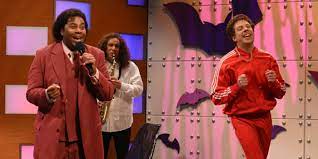
Yeah no this is true. I THINK it has to do with how driving uses so many of your senses and disparate parts of the brain, despite how mundane and easy it seems to us since we have trained ourselves and perceive it as the norm, it is crazy how complicated driving is, and yeah plenty of people have that autopilot experience.
I thought I was just lazy most of my life because I could never wrap my head around how people just do things without getting overwhelmed by 500 things in their head about it first lmfao. Showering is a good example, I’m sure most people find them relaxing and/or do them on autopilot but to me it feels like an elaborate process
Showering is torturous to me and I don’t know why. I think it is because I have to remember to do that, wash my hair, blow dry my hair, etc etc and it just feels like a time sink though I know it’s necessary. Maybe the whole time the reason I hate it is because it is just another thing I HAVE to remember aka devote real energy into that.
Very few things are true for every person with a given neurodivergence. But this is one of the more (most?) common things that people with ADHD struggle with, some to a lesser, some to a greater extent.
As a neurotypical what I don’t understand is, how did the OP get fat in the first place, if they lack habitual behaviour?
They seem to be saying that every single time they ate junk food /fatty food, it would have been a conscious choice that they had to think about first.
Or am I misunderstanding it?
Food is different for me. When I first got diagnosed and medicated for ADHD I realised that I was ALWAYS hungry. Like always. I had never not been hungry in my life. I had been full/stuffed but hunger just does not work properly for me. Meds just suddenly made me recognise it. So I can eat my breakfast and not be craving food in ten minutes again.
Not a doctor but I reckon what I had thought was hunger was actually craving dopamine. So I was eating because I thought I was hungry and looking for the kick of sugary foods but I really just needed balanced dopamine levels
That’s interesting! I have a theory that dopamine levels are out of kilter in a lot more people than we realize.
ADHD can often mean poor impulse control, bad sleep and a difficulty planning proper meals. All that combined with a lack of exercise tends to make ADHD people more likely to be overweight or obese than the general population.
Thanks for the explanation.
I realized when I was 20 that I can’t form habits. I’ve tried my whole life, but everything I do is an active choice, which makes it difficult to do anything at all long term. Things get boring and repetitive and after a while they aren’t interesting enough for me to get my executive functioning to do them anymore. Most things that I do daily, like brush my teeth, are actually things I do out of fear of the consequences of not doing them.
When I worked as a CS rep and had to log into my phone every time I sat down, it was a conscious effort that required active management, every day, for four years. When I get up in the morning to take care of and feed my pets, it’s an active checklist, and while I have a routine of sorts, different parts get missed often, like turning on my coffee machine, opening windows to cool the house, or even turning lights on. I’ve been on a mission to automate as much as possible in my home because things like my fish die otherwise.
The only time I’ve ever experienced auto-pilot has been while driving. And frankly, that scares the hell out of me because I lose time when that happens and have no idea if I did anything dangerous (I’m reasonably sure not because it’s happened often with others in the car, but the feeling is still there).
As you might already know, the “autopilot mode” we go into when driving is a common meme among neurotypicals. And yes, it still scares the shit out of me sometimes when I get home and wonder how I didn’t run anyone over since I was mentally checked out the whole time.
Yes. That’s exactly it. And as soon as you try to form a habit with no visible short-term results or gain, and some form of annoyance in its performance (I know of one person who hates how loud teeth brushing is), it is super-hard-mode.
I can daydream through some actions, but it’s rare, and I fuck up whatever I’m doing. This is because I’m splitting my attention and not actually following a habit.
Starting any activity, including brushing my teeth, is always a conscious choice. I cannot “sleepwalk” into the bathroom to start my day.
A story here. I was in a relationship years ago, every morning this person would wake up and slap the button on their alarm. If they woke up before the alarm, or if the alarm failed, they would still reach over and slap the button. It was a habit.
I cannot develop habits like that. But I’m also not tripped up by habits. There’s no “walk down the hall and automatically turn left”.
The only upside to my particular situation is that I’ve never been hyperactive. Attention deficit, but no hyperactivity. It allows me to have at least some discipline in my day. But that has to be planned out and actively adhered to. It’s a constant struggle, but not as bad as some people I’ve known over the years.
Maybe? Once I get started at something, I can zone out and not consciously think about it, but even getting ready for work, is a different adventure every day.
Sometimes I jump up, get ready, and I leave early, and on the other 24 work days of the month, I’m distracted by the laundry that didn’t get in the dryer, trying to find my keys, reading an article that’s much longer than I thought, and my cats.
I know what I need to do and I go through the checklist, but I wouldn’t call any of it automatic.
What would you consider a habit? I’m honestly very curious. I’m trying to think what things could be done with no thoughr. My brain just doesn’t work that way.
Well the common example here has been brushing your teeth. Shits pretty automatic for me as part of my morning/night routine, I just do it, usually while thinking about other stuff. Same with other things like getting dressed, showering, going to the gym, making a sandwich, eating.
My teeth are all rotten because this has never been the case for me. It’s a chore that I have to actively decide to do every day, it’s a decision I have to make. There’s a phenomenon called “decision fatigue” that basically means you can only make so many decisions in a day before your brain just shuts down and refuses to make another one. Since neurodivergent people have to make more decisions and can’t rely on habits to lift decision making off of our shoulders we often hit that wall of decision fatigue and just kinda shut down.
If you add disincentives, like the fact that brushing your teeth is an inherently unpleasant thing to do, it can be very difficult to stick with it. Hence, rotten teeth and all of the associate health issues that come along with having rotten teeth.
Sorry to hear that, this is a world of difficulty I never imagined some people lived with.
This is why parents of ADHD kids have to hound them to brush their teeth even in teenage years. I won’t relate my history. I’ll just say it was not good.
My situation was compounded by some pretty extreme poverty. My family were basically transients in the eighties and we lived in campgrounds. So it’s not like they were taking me to the dentist when I had a toothache. I stayed in school though, and once I went to a field trip to a dentist and learned about teeth and gums, yadda yadda. Anyway when I came back to camp I asked my parents “Hey why don’t you guys ever take me to a dentist” and they straight up said “What? You got dentist money kid?”
lol. Ah. Nostalgia.
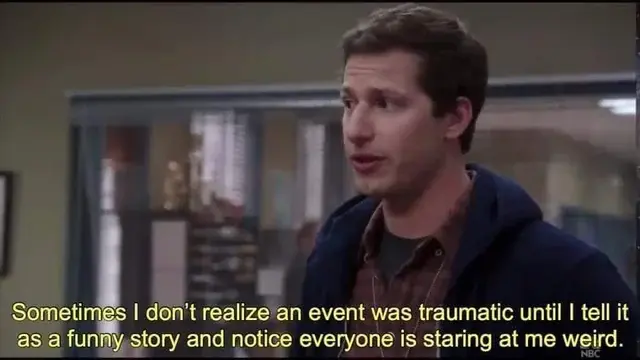
Or alternately when you tell your parents about a memory you have from growing up and they get pissy and say, “You survived”.
Sucks. I’m sorry you experienced that.
Eh. It’s in the rear view. This meme is on point though. I had no idea any of that stuff was even abnormal until I hit high school and started talking about it. It’s crazy what kids will assume is normal because they don’t have outside frame of reference.
That helps. Thank you. Those things all take thought and planning for me. I have a travel toothbrush and toothpaste in my purse because I forget to brush my teeth more often that I like to admit. I’ve been taking an inhaler twice a day for 35 years and I forget frequently.
I just do it, usually while thinking about other stuff.
So, for me if I start thinking about other stuff very much while doing something like brushing my teeth, I stop doing the something. Like, literally I’ll snap out of a chain of thought that I mostly don’t remember (‘why am I thinking about harvesting cranberries? I need to get to work!’) and I’ll realize I’ve just spent a minute or two standing still in the bathroom holding my toothbrush and toothpaste staring at nothing in particular.
If I start thinking about something mid-process I’ll end up missing part. The entire process requires attention. I have to mentally label 12 areas, A-L, then count 10 seconds for each area, every single time, A 0123456789, B0123456789, C0123456789, etc.
Wow. I honestly thought I was just lazy. Thank you for sharing. Everything other than sleep requires energy and effort. I wish I knew before I was in my 40s that I had ADHD!
They’re… Automatic? WTF.
😐
The OP is just using some wildly different definition of habits than everyone uses. No one has a “habit of doing yearly taxes” lol.
It’s really not as extreme as this guy implies. I guarantee you he has habits he’s not mentioning, it’s just that adhd have more of a tendency to forget them because we’ll get distracted by something else. I think about brushing my teeth, yes, but once I get started I day dream through it. I’m diagnosed ADHD and medicated.
Conversely, I have been considered to be neurotypical all of my life, though I do have a lot of other issues (chronic illnesses) so I wouldn’t rule out it being missed because of those ending up taking up all of the “bandwidth” so to speak - and I can think of very few daily habits that I have off the top of my head. Or, they’re cloaked in a way that I don’t “feel” they are habits, I’ll try to explain that a bit better:
Most things that I do, it almost feels like there’s an explicit direct cause -> effect correlation as to why. I suck at remembering to brush my teeth. But showering? I do so because I hate when there is that feeling of my legs running against each other in bed and there’s an almost sticky (?) like feeling.
And I’m reminded of that feeling because unfortunately for me, laying in bed isn’t only a thing I do during bedtime and occasional certain “activities with others” which is when they say is the only time of the day you should be in bed. I’ll get the aforementioned feeling and go “I need to take a shower before I plan to actually sleep”.
Or sleeping doesn’t tend to be a habit that I have in terms of going to bed at a specific time of day/night, I do so because I feel the amount of energy I have is too low for me to do anything more productive in the day (or to regain the energy by having say a meal). Exception of course is if I have an early appointment the next day that I know is going to require me to need some amount of rest for, and even then actually falling asleep is a struggle.
Or speaking of meals, I don’t stick with a explicit “three meals of day” plan - I usually skip breakfast and only have (maybe) lunch and dinner. I’ll just have something to eat when I directly feel hunger and realize I haven’t eaten in X amount of time. I’ll have a couple of light snacks here and there to bridge the gap if I need to. This one though, I feel is more or less related to how my GI condition plays a part in my own internal risk vs reward scenario.
I also don’t necessarily feel what others/my friends might describe as an almost instinctive desire to check social media whenever I wake up - I run the Lemmy instance I’m on so of course I do check to make sure it’s still running, and this morning in particular I didn’t have anything else that needed immediate doing, and came across this post in “All”.
I use reminders on my phone to make sure I take my medications at an appropriate time since my sleep schedule is not consistent enough for me to just always take it when I wake up / before I go to sleep (I’ve been told that some of the ones I’m on work best if you take them at roighly a consistent time).
I work from home and clock in on time because I’m always looking at the time when I know it’s around the corner, but I still have alarms and calendar events set to nudge me as well however.
I do my laundry when I go to take a shower and realize I have fewer choices of clean clothes to pick from, and set a reminder for the next day to do so. Similarly, I order more groceries when I have fewer choices of food to pick from (which thankfully doesn’t involve running loud machines that will wake up others, so I can do that immediately rather than deferring it to the next day).
I charge my phone and my watch when I get a notification that they’re low on batteries, not as part of a going-to-bed-ritual (and this certainly has bitten me on plenty of occasions).
I guess a better way to describe it all is that pretty much everything I do is “reactionary”. I do everything as the need arises, nothing (well, off the top of my head) is really automatic in the same way I see from others. Most of the time I can tell you what prompted me to do something.
I will say that I have what I (along with my psychiatrist and therapist) can only describe as “rolling chronic depression”, but even when it affects me the least, this doesn’t change.
Reminder that this, like many things associated with ADHD, is normal for neurotypical people, too.
It tends to be more common or more pervasive for people with ADHD, but it isn’t exclusive to people with ADHD.
General tip: Whenever you see someone claim that a certain way of thinking is exclusive to people with ADHD, they’re most likely wrong.
I think the rubric is basically whether or not the behavior is disruptive to your life. Many neurotypical people do those things from time to time, but if it becomes overwhelming and pervasive, and keeps you from functioning effectively, it’s time for an evaluation.
Would having off the charts procrastination on even the tiniest tasks that I absolutely know have to be done to the point of having to pay thousands for a dental problem I put off until i couldn’t stand the pain count as disruptive to my life? Not sure why I asked this because I answered my own question damn. Glad I started therapy so I can get to the bottom of this.
Agreed. 100%.
Sometimes though, when we’re frustrated and dumping that out, it sounds like we are saying that. It’s very easy to ‘us vs. them’ the situation.
Example: “Oh my god! Other people remember that they are boiling water for eggs? I have ADHD and I forget and leave the kitchen to do something else all the time. This suuuucks! It’s not fair for us.” I’m sure that there are some ADHD people who don’t have to work with a technique just to cook eggs (I do. I set timers.), but there you have it.
I’m sorry… What?
For neurotypicals… Habits are automated processes? Brains have that function built in?
On some days, it feels like I have to breathe and blink manually.
No, neurotypicals don’t just automatically go exercise. Its a choice they make.
Yep, and not just that either. It’s like that all the time. Ha it’s are just things you do without thinking, like reaching for your phone or wanting a smoke/drink/snack.
Now, choosing to set aside a time of day and a routine for something, like exercise, can help ease the barrier to starting that thing. This is sometimes described as a habit, though it is not, psychologically speaking, a habit.
No, neurotypical people have to think about actions before we take them. We aren’t robots. I don’t automatically get up from the couch, make dinner, and then eat it without thinking about it.
We get distracted and forget things, too. I went to the coffee shop the other day and realized I left my wallet at home.
My brother has extreme ADHD, and it’s much harder for him to manage everyday things. He might hyper focus on something and forget to eat all day, etc, but we both have to consciously do tasks just the same.
I was about to ask also shit blinking and breathing
If you tell someone to breathe with you, and after inhaling and exhaling a couple times and just tell them that they are now breathing manually they actually just can’t choose to switch back to automatic breathing, so they are stuck manually breathing till they divert their attention with out noticing, it’s funny though
I had to blink.
I day dream so much I’m arguably not present
I fail to see how this is not the case for everyone.
Absolutely no one has a habit of paying taxes. Or brushing their teeth.
I would argue that what you have is depression here, not adhd. You need help.
They weren’t claiming that people had a habit for paying taxes in general but that because nothing else is a habit they lack the energy to do the things that other people already consider draining when they had to spend so much on things that come naturally and in a way for free to others.
I would argue that brushing your teeth certainly seems to be habitual for most people. It’s something they’d do if they went through the bathroom routine in the morning while effectively still asleep. This person is saying that if they don’t effectively stand in the bathroom and look at the brush and decide “I will now brush my teeth.” they won’t do it, where someone else had grabbed the brush while thinking about what they need to get done later in the day.
Depression on the other hand would more likely manifest in a disregard for the necessity of the activity. This person says they do brush their teeth, they want to brush their teeth and they are ready to spend their existing energy on it.
A depressed person often would not be convinced that it matters, nor that they could even make themselves do it if they felt like they had to. Though naturally depression is expressed in many ways, as is any type of neurodivergence. It’s hard to put strong labels on these things. Nonetheless it seems sensible to differentiate on these things as most neurodivergence is simply a set of untypical phenomena and behaviour that have collected up enough to start becoming notable.
A person considered completely normal could suffer from the same but simply manage well enough for it to never stick out. No one is entirely normal.
Yeah the “meat suit” comment makes me think some kind of dysmorphia or something , that’s friggin weird man. Our meat suits are how we experience the universe and they profoundly impact our state of mind and being. To deny it demonstrates a very odd disconnect from reality.
I think the OP was being dramatic for emphasis with the “meat suit” comment. That said, I’m guessing that you’re younger than me or have few health complaints. Not casting shade, but it’s not exactly uncommon for people as they age to start feeling a mind-body disconnect. For example, my mind says, “I can redo my own roof!!!” and my knees say, “hahahaha foolish hu-mon,” (they’re Ferengi knees) “we will randomly dislocate your kneecaps the moment you get up there and you fall to your death.” I’m not saying I think I have a “meat suit” every day, but there are definitely stretches of weeks when my body is having a spell that I definitely feel that way.
I actually do have a habit of brushing my teeth. It’s part of my morning routine, which I do in the exact same order, every day. But, I’m autistic (I was diagnosed as a teen in the 80s). I’m one of those persons that has a very exact routine, and get really upset when my routine gets interrupted.
But, I do agree with you that some of those symptoms seem more indicative of depression than ADHD.
You always are mentally and actively doing something otherwise you’d be unconscious. Habits just means the mental resistance becomes a lot lower. If you struggle to brush your teeth, it’s a lot of effort to initially get you to go the bathroom. When it’s a habit, there’s usually a trigger that gets you to go to the bathroom without having to expend all that energy as much. Unconscious habits are automatic which are different.
Yeah this. I don’t automatically do things without thinking.
I like to make a cup of coffee each morning. It’s a habit. I don’t really spend time thinking about whether I’m going to do it first thing each morning because it’s so deeply ingrained - of course I will want to do that tomorrow when I wake up. I’ve performed this ritual so many times that I do know all the steps (although I do occasionally fuck it up).
However, I’m not going through this process like an automaton free of thought - somewhere between the bed and the kitchen there’s still a decision that I’m going to make a coffee. Some mornings I pee before coffee, some mornings it’s after - there are decisions being made.
The thing is I’ve been making a cup of coffee reliably every morning for more than a decade and I still need to spend time thinking about whether I’m going to do it.
Exactly and there isn’t a guarantee that you will always remember to do so, right? It is like the memory of these tasks that are part of average people’s routines has to start over fresh every single fucking day, multiple times a day depending on the task or your mood or whatever else may distract you.
Yeah. Like the character in memento I suppose, albeit in a subtler way.
Yes but for “normal” non-ADHD people, usually the action in question becomes a routine that requires very little thinking energy. This isn’t always the case with ADHD people. I have learned to adapt to certain things like brushing teeth, taking my allergy meds is a new one because allergy season in the south has gotten so bad, but the key factor, I think is that consistency is just about impossible. As someone up above posted, we will fall off a cliff and drop all of it, and who knows when we will pick it all back up again, because it is a constant mental strain. You don’t have to think about walking and breathing, but sometimes ADHD people may as well have to when it comes to thinking about accomplishing things.
I think with ADHD people things that end up taking very little thinking energy for non ADHD people, take the same amount of energy if not more, all the time, which is exhausting. I believe it is easy to take that for granted if you’re not having to expend the energy constantly.
Yes, that’s how habits work. They are mostly automatic.
No, that’s not how brushing your teeth, flossing, taking the time to exercise or drinking water works as those are not habits at all.
PS: Drinking water might be the exception. You might be able to create a habit out of it… by taking the concious choice to always make some water readily available…
Yeah, it feels strange to say something like “I have a habit of locking my door when I come inside, I don’t even think about it, it is totally automatic for me” and then say “I don’t have a habit of going to the gym because I have to consciously make effort to do it.” Like yeah, no shit going to the gym “takes effort” that locking a door doesn’t. That doesn’t make one a habit and not a habit.
There seems to be two usages of habit going on and they’re being conflated. Something as big as exercising cannot become so automatic that you do it without thinking. That doesn’t mean it isn’t a “habit.” Things as easy as buckling a seatbelt or locking a door can become automatic and thoughtless but that isn’t the aspect that makes them habits.
I find it hard to make these criticisms because I don’t want to sound like I’m saying “just get over it” for dealing with ADHD. I have it too. There are tons of things that I’m jealous of neurotypical folks of for being able to do easily. I get the feeling of this post but I can’t help but feel that they have totally misunderstood what people mean by habits. I also still feel like developing good habits might be easier for neurotypical folks, but the idea that they just do something as complex and involved as exercising totally on autopilot rather than deciding to go do it is off. It’s easy to get into this self defeating mindset with ADHD of feeling like you can’t do something. I don’t want people to fall into that trap just because they misunderstand what people mean by the word habit.
Yeah it seems like a lot of people are confusing routines with habits. It’s definitely possible to get into a routine of going to the gym, eating a healthy breakfast, and then showering and brushing your teeth. None of those things are effortless, nor will they ever be.
I have entirely forgotten glasses of water and plates of food for 6+ hours at a time that are directly next to me. The struggle is real.
deleted by creator
Thank you. I appreciate the politeness.
I think I can confidently say that I have habits. I am ADHD, and I have habits. Not good habits like brushing my teeth, or chores or anything…
No. My habits are either useless, or actively detrimental. Things like chewing my finger nails, or self-soothing behaviors like when I rub my feet together (drives my SO nuts). Stuff like that which I do subconsciously.
Everything else requires some measure of effort to get to doing… Usually when I’m in the process of getting something done, it’s far easier to see it through to conclusion, vs. Getting started…
Habits doesn’t and shouldn’t imply that the habits are good. Things I consider habitual now are a result of many years of doing the same things over and over in the same way with a consistent result…
@MystikIncarnate @blueskiesoc but then, as you describe they are self-soothing - are they habits, or are they stims?
So you’re saying if you didn’t have bad habits, you’d have no habits at all. I’ll see myself out.
It’s fine. Just always be present. 100% of the time. Always be aware of what you are doing, what you need to do, and what you are doing next. Don’t forget to be thinking about what is happening today. Also, keep in mind what is happening next week.
Pretty sure I forgot to take my stomach pill today. The same pill I take every morning, for about 7 years.
Oops.
deleted by creator
This is why it’s so hard to have these conversations with neurotypicals in particular. A majority of the time, NDs don’t even know what they’re struggling with because it’s so automatic at this stage. And when things get boiled down to “nobody just runs a marathon automatically without deciding to lol silly!” it gets even more challenging.
I so relate to this. I listen to audiobooks or podcasts all the time because it keeps my brain partially occupied. Forgetting to take meds is a huge issue for me. I’m asthmatic and need to take an inhaler twice a day. I’ve been using an inhaler for 35 years and I still can’t remember regulary. I’m broken.
Podcasts and audiobooks are great for keeping the mind amused while doing representative tasks.
And at the same time think about that time someone was mean to you 8 years ago
Can’t. I’m too busy planning projects that I will either start now or do later.
Yea, i do that too, except i actively work on all of them, most of my projects are it/server projects for for my self, but i do work on like 10 projects at a time, though because i dont have money for an expensive server, i use an old computer that currently cant do any of the things i need from it, so im just slowly upgrading it
Are you me? Seriously, I have been slowly migrating my windows primary machine to a Mint system. I bought my first M.2 NVME and am loving the responsiveness.
The drives coming out of there are going to my file server, which is all the components I was using before the upgrade.
I was in my mid 30’s when I was diagnosed with ADHD. Actually my twin daughter’s ADHD doctor asked me at one of their appointments if I had ever been tested/ seen about it. I was kinda confused since I didn’t think at the time I had it. Once I get tested and then started on ADHD meds… my whole life of struggles became clear. I had struggled with anxiety and depression from middle school on and was on two-three meds for that. Even then I still struggled with anxiety and panic.
Once started on ADHD meds, no longer needed my anxiety or depression meds. My doc said my ADHD presented with that. So that was a bonus!
I can’t stay focused, I “spin in circles” as I call it. Where my brain is like “boot looping” basically. I can’t start all the projects/ tasks I know I need/want to do… so I literally… SPIN. I get super frustrated with unfinished tasks and easily get distracted with something new.
Ie; folding laundry… start putting them away and see I need to empty the trash in the bathroom, then, see the dishes need doing so Ofc I start washing them…and then one of my daughters starts talking to me and I’m off doing something else for them. End result? Bullshit. Laundry not done, dishes half assed… kid’s task… well that’s completely done cause I have them there in front of me making sure it’s done… oh and trash IS emptied but I lost the trash can somewhere. Probably where the laundry is.
That is a typical day. I also am so “busy” all day I don’t eat till right when I’m sitting down for the first time all day and then I graze all evening long till bedtime…
halfrommalcolminthemiddle.gif
The shame of the incomplete task. Or I restarted it several times, got lost, and fully fucked it.
Relatable
Neurotypical here, as far as I know.
No, there is nothing about brushing my teeth that’s automatic. At some point during the evening I usually notice fuzzy-feeling teeth, or as I’m nodding off while reading my book will think “oh no, I never brushed my teeth…” There is always some small element of discipline to getting up and doing the thing. But I can usually remember without having to set an alarm or post a sticky note, if that meets your definition of “habit”.
Exercise is brutal and IMO, that never gets easier, either. In contrast, I generally have an easier time with mental discipline & focus compared to physical tasks.
Strangely enough, as a (mostly) white Millennial woman, the majority of my peers now claim to have adult-onset/adult-diagnosed ADHD. Maybe this is an accurate diagnosis for some. And even if it’s an exaggeration in other cases, who cares, as long as the coping strategies or medication is improving someone’s quality of life.
What’s sad to me, though, is when the diagnosis becomes an all-consuming identity and an excuse to stop trying altogether, a way to shut out the rest of the world. These women I know who excelled in school and work or had creative hobbies and traveled the world, now they just post mental health memes all day and joke about how it’s impossible to get out of bed. And if anyone suggests maybe they TRY getting out of bed and see how it feels to participate in X, Y, Z activity like we used to, then come the accusations that we’re clueless NTs who will never understand what it’s like to struggle.
And that’s just not true. NTs also work hard and struggle at times…that’s life. So let’s just make sure all these diagnoses are helping and working FOR us rather than AGAINST us. And sometimes forgetting to brush your teeth is just … forgetting to brush your teeth.
As far as I know, I’m neurotypical and stuff is still the same for me as OP. I don’t think it’s a neurotypical or not thing, I just think different people form habits differently.
Executive dysfunction is a symptom of lots of issues, you might well be neurodivergent to some degree. For me it’s Executive dysfunction. Time blindness. and a degree of face blindness. All of these things are super disruptive to my life.
It’s the same for 99.999% of people. There ain’t a person on the planet that exercises automatically lol. “Oh geeze I didn’t even realize I just ran those 10 miles it’s just such a habit I didn’t even think about it.”
Sure, there are certain tiny things that you form a habit with like maybe saying “you too” any time somebody says for you to “have a nice ___” which explains why sooo many people have that embarrassing moment when like a waiter drops food on your table and is like “enjoy your meal” and you say “thanks, you too!” Something like that is this person’s version of a habit.
But other things like brushing your teeth or cooking dinner or exercising or picking up your kids from school or something isn’t an automatic action the way it’s described here for almost everyone. I’m sure there’s some huge outliers out there that swear they do all these things completely unconsciously or whatever but I’d argue they are an outrageously small minority.
I think this is a combination of conflating multiple things into one generic definition of what a habit is, and then attributing that trait to the general public unanimously.
It honestly reads like an excuse to not exercise and then blame your weight problems on things that are outside of your control.
I jog a lot. It sucks every time and it’s hard to get out and do it every time. I still do it. It’s not a “turn off my brain and I’m just magically fitter” thing.
This person is looking for excuses for their weight problems it seems to me.
For better or for worse, this is normal. Habits are never really easy to be honest, and they remain easy to break forever. I tried to make a habit out of flossing. I did it for awhile, and it almost felt like a habit I formed anew, but then one day I skipped it and it was all over. Hell I skip brushing my teeth sometimes and I actively have to avoid falling out of that habit too.
I don’t know if that helps or not. But I believe almost everyone feels this way about habit formation. I think you’re just more aware of your choice. Everyone does the activity consciously but most people aren’t really analyzing it in the same way as you describe.
Yeah. The neurodivergent typically think that living like a robot is the solution to their problems. Everything needs to be in its place, or everything is wrong.
Hygiene is the thing I struggle with. Every time i brush my teeth it’s, “I’d better do it while I’m think about it.” Showering is an active choice which i hate doing because I dispise how my body looks. Exercising? Absolutely terrified because the last time I truly exercised I almost died due to a septic pelvis injury.
Often enough I dont have enough spoons to do everything I do in the day and spend a lot of it in bed. I’m currently trying to find a source of income and have put some images on redbubble, but the thought of holding down a job is foreign. ADHD, Autism, and Anxiety are not a good mix
Showering is an active choice which i hate doing because I dispise how my body looks.
Aha! I knew my “challenge” would come in handy sometime! I’m severely near-sighted and have pretty bad astigmatism, so for all I know, my body looks like Tom Brady
deleted by creator
It seems that this aligns best to my experience. Habits encourage you to do something and it kind of becomes easier - but not automatic. Definitely never automatic. E.g. with teeth brushing - I will not automatically brush if I am not at home. It may also be difficult if I accidentally fall asleep on the couch…
deleted by creator





